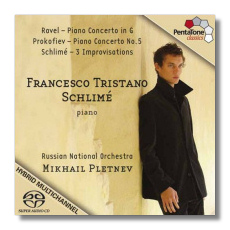
The Internet's Premier Classical Music Source
Related Links
- Latest Reviews
- More Reviews
-
By Composer
-
Collections
DVD & Blu-ray
Books
Concert Reviews
Articles/Interviews
Software
Audio
Search Amazon
Recommended Links
Site News
 SACD Review
SACD Review
Francesco Tristano Schlimé

- Maurice Ravel: Piano Concerto in G Major (1931)
- Serge Prokofieff: Piano Concerto #5 in G Major (1932)
- Francesco Tristano Schlimé: 3 Improvisations
Francesco Tristano Schlimé, piano
Russian National Orchestra/Mikhail Pletnev
Pentatone SACD PTC5186080 Hybrid Multichannel
In the oddly-translated liner notes Bianca Robichaud points out the unusual similarities between the two major works here: the pair not only date to the early 1930s and share the key of G Major, but both came after concertos written for the left hand alone, specifically for the one-armed pianist Paul Wittgenstein. Wittgenstein, in a colossal blunder, rejected Prokofieff's concerto but played Ravel's, claiming he didn't understand a note of the Russian composer's piece. But, lest I digress too long, we can't focus on Wittgenstein's obviously limited taste; rather, we must thank him for inspiring these composers to write those two masterpieces.
Ravel and Prokofieff – arguably the two most popular 20th-century composers – produced quite different follow-up works – Ravel's is a jazz-inspired, post-Romantic concerto of lightness and much charm. Prokofieff's is neo-Classical, arid – like much of his music from his French years – and rife with colorful themes and imaginative ideas. Young Luxembourg-born pianist Francesco Tristano Schlimé stresses the neo-Classical side of the Prokofieff, albeit with mostly relaxed tempos and a less percussive touch, producing a well-played, at times subtly-nuanced but less viscerally exciting performance of the concerto than can be had from Richter/Rowicki (DG), Richter/Maazel (EMI), Ashkenazy/Previn (Decca), and Boris Berman/Järvi (Chandos).
Still, Schlimé's reading isn't bad by any means. I suspect he's come under the influence of his conductor (and former teacher) here, Mikhail Pletnev, a formidable pianist in his own right, who in his recent recordings has taken a more relaxed and ponderous approach to various works. Try his DG recording of the third concertos of Prokofieff and Rachmaninoff, with like-minded Mstislav Rostropovich.
Schlimé's Ravel is also more than passable, but some will find his second movement Adagio assai just too slow. At over eleven minutes, it's two or three minutes slower than all other interpretations I've heard. His outer movements are decently-played, again with relaxed tempos, though arguably his more measured approach works nicely in the lovely alternate theme of the first movement. The sound on both concertos is good, recorded at slightly lower levels than usual, however.
The 3 Improvisations, for solo piano, by Schlimé are less interesting, and their vague quotations of material in the two concertos here will not likely register strongly with the average listener. The three-movement work (Reveal; Progression; Return) is a mostly pleasant mixture of impressionism, jazz, and ponderous dark music, the whole vaguely exuding Prokofieff, Messiaen and modern jazz. An interesting recording then from relative newcomer Schlimé. Perhaps the promise he shows in these recordings will be realized in the near future with a different conductor. Recommended to those wanting to sample an interesting new talent.
Copyright © 2006, Robert Cummings




















